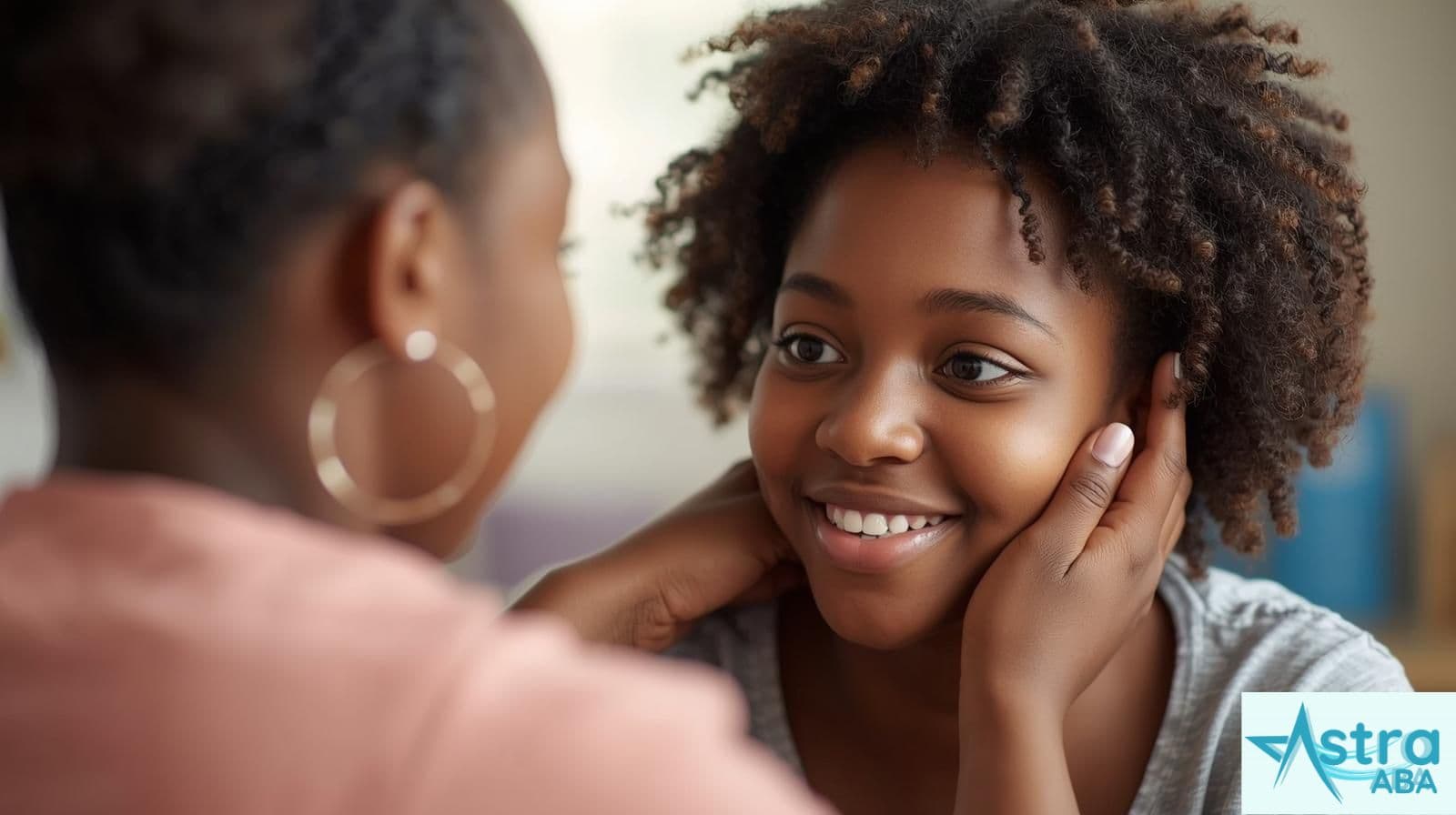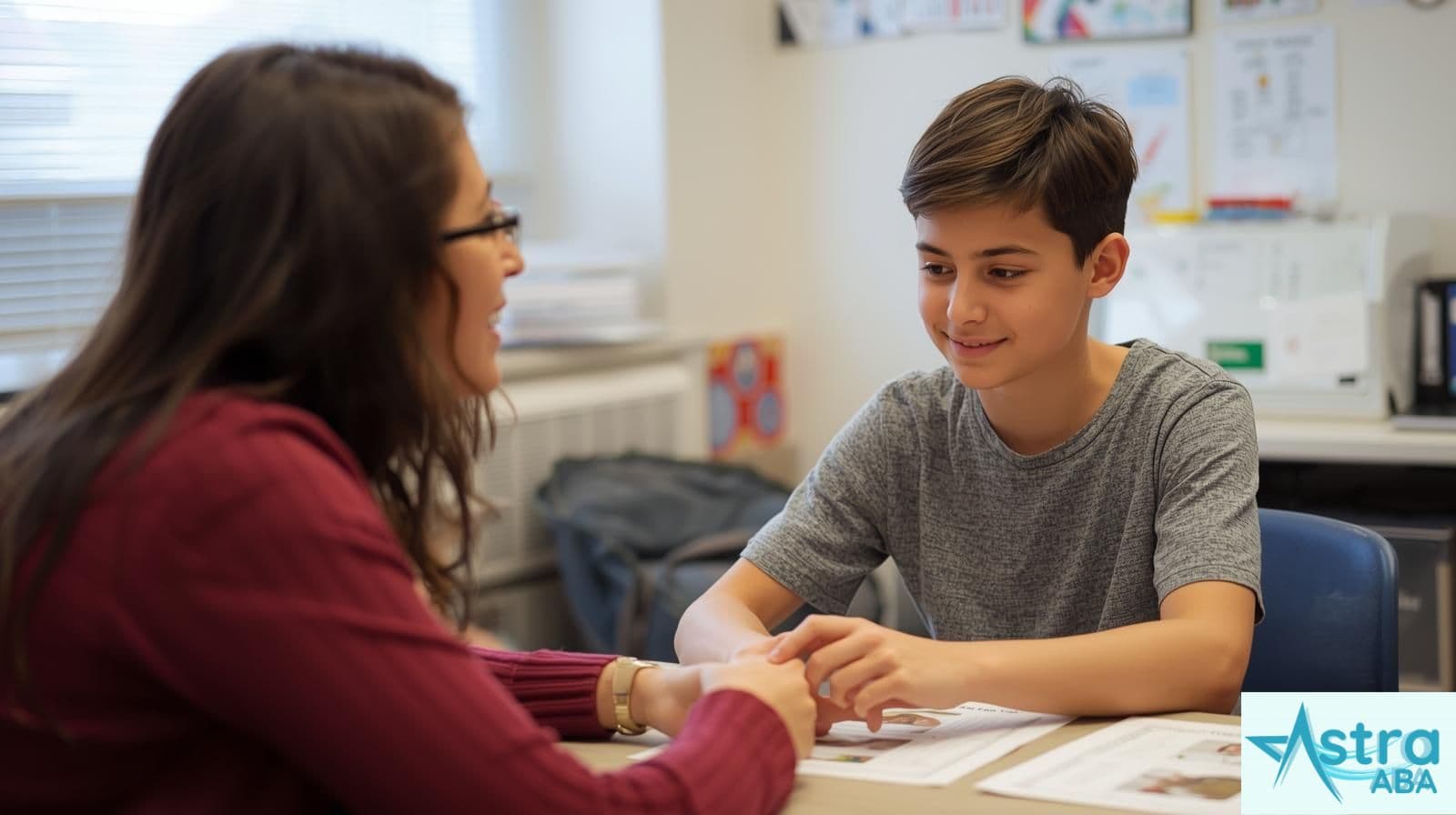Building Friendships Through ABA Therapy for Teenagers with Autism
Help your autistic teen build real-life relationship skills with ABA therapy for teenagers. Learn key goals, tools, and strategies that truly support social growth.
September 28, 2025
Key Points:
- Relationship-building challenges in autistic teens can be supported through targeted ABA strategies.
- ABA therapy for teenagers includes individualized social skills goals and boundary-setting training.
- Socialization progress should be guided by formal ABA social skills assessments and ongoing skill-building.
As children with autism grow into teenagers, the expectations around peer relationships, emotional regulation, and independence shift significantly. For many parents and caregivers, watching their teen struggle to form and maintain friendships, or even understand social expectations, can be disheartening and stressful. Autistic teens may desire connection, but find it difficult to read social cues, set boundaries, or engage in conversations, especially as peer dynamics become more complex in adolescence.
Applied Behavior Analysis (ABA) provides practical, structured tools to help build these essential relationship skills. In this article, we’ll explore how ABA therapy for teenagers can support autistic youth in developing healthier, more confident social connections, and how caregivers can play an active role in the process.
Understanding the Social Landscape for Autistic Teens
Teenage years are typically filled with social milestones - group outings, first crushes, team projects, and shared hobbies. For teens with autism, however, these experiences can be overwhelming, confusing, or even isolating.
Difficulties may include:
- Trouble interpreting facial expressions, tone of voice, or body language
- Challenges understanding sarcasm, teasing, or jokes
- Rigidity in conversation topics or routines
- Difficulty initiating or maintaining conversations
- Struggles with setting or respecting boundaries in relationships
These challenges are not a result of a lack of interest in relationships, but rather a need for intentional, skill-based teaching. This is where ABA therapy for autistic children and teens becomes incredibly valuable.
How ABA Therapy for Teenagers Builds Relationship Skills
ABA therapy for teenagers isn’t a one-size-fits-all approach, it is tailored to the individual’s strengths, needs, and developmental goals. For teens, this often means shifting the focus of therapy from basic life skills to more nuanced social and emotional competencies.
Some key areas ABA targets for relationship development include:
- Initiating and maintaining conversations
- Perspective-taking and empathy development
- Understanding and practicing consent and boundaries
- Cooperation and compromise
- Self-regulation in emotional or high-stress interactions
Therapists use evidence-based techniques such as modeling, role-playing, video modeling, reinforcement systems, and natural environment teaching to teach and reinforce these skills in realistic settings.

Starting with an ABA Social Skills Assessment
Before setting social skills ABA goals, a comprehensive ABA social skills assessment should be conducted. This structured evaluation helps pinpoint current strengths, lagging areas, and situational triggers.
A quality assessment may include:
- Observations in different settings (home, school, clinic)
- Interviews with caregivers and teachers
- Structured role-play scenarios
- Skills checklists focusing on communication, group participation, self-awareness, and emotional reciprocity
Results from this assessment inform the treatment plan, ensuring that the teen is working on the skills most essential for their stage of development and personal goals.
Individualized Social Skills ABA Goals for Teens
Once the assessment is complete, therapists collaborate with families to create specific, measurable, and meaningful goals.
Some examples of social skills ABA goals for teens include:
- Engage in a back-and-forth conversation with a peer for 3-5 turns.
- Identify and express when personal space feels uncomfortable.
- Participate in a cooperative group activity for 10+ minutes.
- Practice declining invitations or requests politely but assertively.
- Label and respond appropriately to at least five common nonverbal cues.
These goals are not only about skills but about functional, real-world application. The teen is learning in context, not just memorizing scripts.
Developing Socialization Skills for Teenagers in Real Life
While structured therapy sessions are crucial, the real test of progress happens in natural environments, at school, at home, or during extracurriculars.
Parents and caregivers can support generalization of socialization skills for teenagers by:
- Organizing low-pressure social opportunities with peers who share similar interests
- Modeling and narrating appropriate social behavior during family interactions
- Encouraging participation in interest-based clubs, sports, or community activities
- Reinforcing progress and effort, not just outcomes
- Allowing the teen to have a say in who they spend time with and how
Therapists may also implement community-based instruction to help teens practice navigating public spaces, ordering food, joining group games, or managing peer conflict in real time.
Teaching Boundaries and Relationship Safety
One of the most critical and often overlooked components of social skill development in autistic teens is teaching about autism boundaries in relationships. Teens must learn what is and isn’t appropriate behavior, both from others and from themselves.
Key boundary-setting concepts may include:
- Understanding consent and the importance of “no”
- Identifying red flags in friendships or dating relationships
- Recognizing and expressing personal comfort levels
- Learning to differentiate between acquaintances, friends, and intimate partners
- Respecting others’ boundaries, even when disappointed
Using visuals, social stories, and role-plays, ABA therapists help teens understand both physical and emotional boundaries. This can be particularly important as teens begin to explore romantic interests or navigate more emotionally complex peer dynamics.

The Role of Caregivers in Supporting Teen Social Skills
While therapists provide structured teaching, caregivers are instrumental in reinforcing and supporting these efforts at home. You don’t need to be a behavior analyst to help.
Tips for families:
- Use consistent language around boundaries and respect
- Prompt and praise social attempts, even small ones
- Discuss social situations from shows or books to explore what went well or what could be improved
- Role-play situations your teen might find tricky before they happen (e.g., asking to join a group activity)
- Collaborate with your teen’s therapy team to stay aligned on goals and strategies
When families and therapists work together, teens are more likely to retain and apply what they learn.
Creative Ways to Build Peer Connections
Building social skills for teens with autism doesn’t always have to be formal. Creative and interest-based activities can make social learning more natural.
Some ideas include:
- Board game clubs: Builds turn-taking, rule-following, and conversation skills
- Art or coding groups: Allows self-expression while sharing space and ideas
- Volunteer work: Encourages teamwork and community involvement
- Peer mentorship: Pairing with neurotypical or similarly developing peers for mutual learning
Matching the activity to the teen’s interests lowers anxiety and increases the chances of positive peer interaction.
ABA Therapy as a Foundation for Relationship Growth
Relationship-building is a long-term journey for many autistic teens, but progress is entirely possible with the right support. ABA therapy for teenagers provides a structured yet flexible framework to teach critical interpersonal skills, including communication, empathy, boundary-setting, and emotional regulation.
By grounding interventions in assessments, setting meaningful goals, and reinforcing progress across settings, ABA therapy supports not only skill development but confidence. With consistent practice and encouragement, autistic teens can build fulfilling, respectful, and safe relationships that align with their personal values and comfort.
If your teen is struggling with friendships, boundaries, or social connections, now is the time to seek support. At Astra ABA, we specialize in ABA therapy for teenagers and focus on empowering autistic youth to build the skills they need for real-life relationships.
Our services at Astra ABA are available in Indiana, North Carolina, and Kansas, and our experienced therapists work closely with families to develop personalized plans based on your teen’s unique needs.
Don’t wait for your teen to “figure it out” on their own. Help them gain the confidence and skills they need to build lasting, meaningful connections. Contact us today to learn more about our ABA therapy services near you.
Related Content
Liked this article? Check out these related posts to learn even more!






Ready to start your journey with ASTRA ABA?
Contact us today for a consultation and let us be a part of your child's path to success.
Get In Touch







.png)





